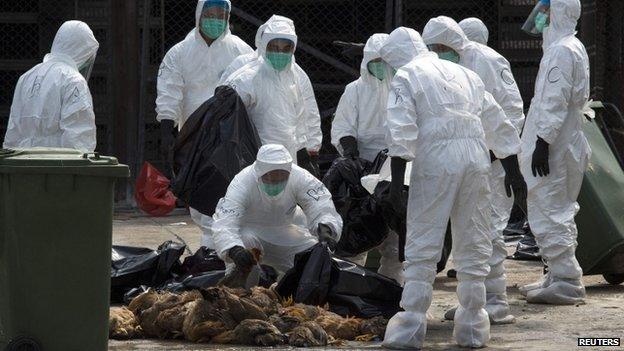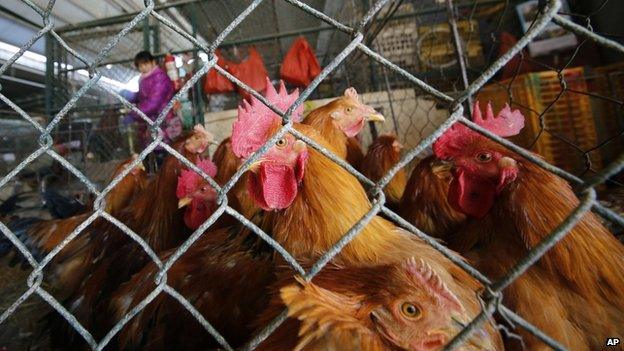H7N9 bird flu virus: Hong Kong culls 20,000 chickens
- Published

The wholesale market will be closed for 21 days for disinfection
Hong Kong has begun culling 20,000 chickens after the H7N9 bird flu virus was found in poultry imported from mainland China.
All chickens at the wholesale market where the positive test took place were to be destroyed, the government said.
The government has also banned the import of live chickens from the mainland for three weeks.
H7N9 made the jump from infecting domestic chickens and ducks to infecting people in early 2013.
In mainland China, where most of the recent cases have been, state media said live poultry trading had been halted in three cities in Zhejiang province, where 12 people have died from H7N9 this month.
Shanghai would also halt live poultry trading from 31 January for three months, state media said.
The measures come as China prepares to celebrate the Lunar New Year holiday, with hundreds of millions of people travelling across the country to spend time with relatives.
Sales of live chickens traditionally rise ahead of the holiday period.
'More testing'
According to the World Health Organisation, external, cases of human H7N9 infection have been reported so far in China, Hong Kong and Taiwan.
The virus emerged in humans in early 2013. To date there have been more than 200 cases, with more than 50 deaths.
Most of those infected reported contact with live poultry, and information so far did not support sustained human-to-human transmission, the WHO said.
Hong Kong's Secretary for Food and Health Ko Wing-man said in a statement , externalthat Cheung Sha Wan market - the territory's only wholesale poultry market - would be closed for 21 days for disinfection.
Local farms would also suspend sending chickens to the wholesale market.

Most of the H7N9 human cases to date have been in mainland China
Officials would "inspect all the local chicken farms and collect more samples for testing to ensure that local farms are not affected by H7 avian influenza", he said.
Television footage showed officials in protective suits putting chickens into bins pumped with carbon dioxide to cull them.
The operation was expected to take around 10 hours, and the dead chicken would be taken to a landfill, a spokesman from the Agriculture, Fisheries and Conservation Department told AFP news agency.
This is Hong Kong's first mass cull of live poultry in three years, the BBC's Juliana Liu in Hong Kong reports.
Chicken stall owners have said they will lose money as a result of the cull.
Hong Kong last culled chickens and banned imports in December 2011, over the H5N1 bird flu virus.
- Published23 January 2014
- Published1 May 2013
- Published23 January 2014
- Published7 August 2013
- Published28 May 2013
- Published10 September 2013